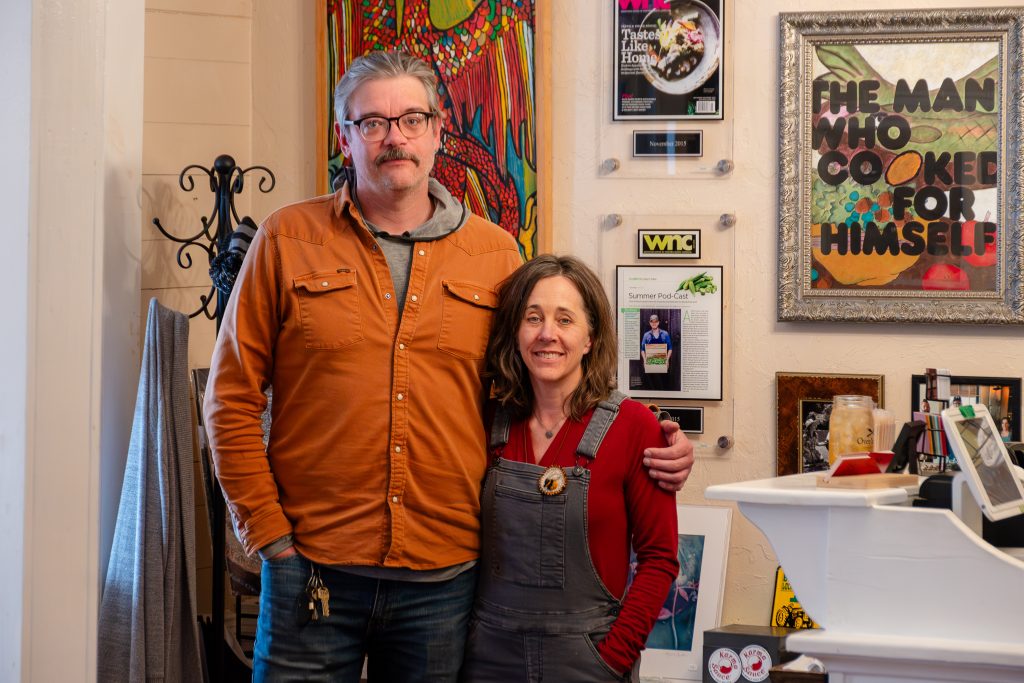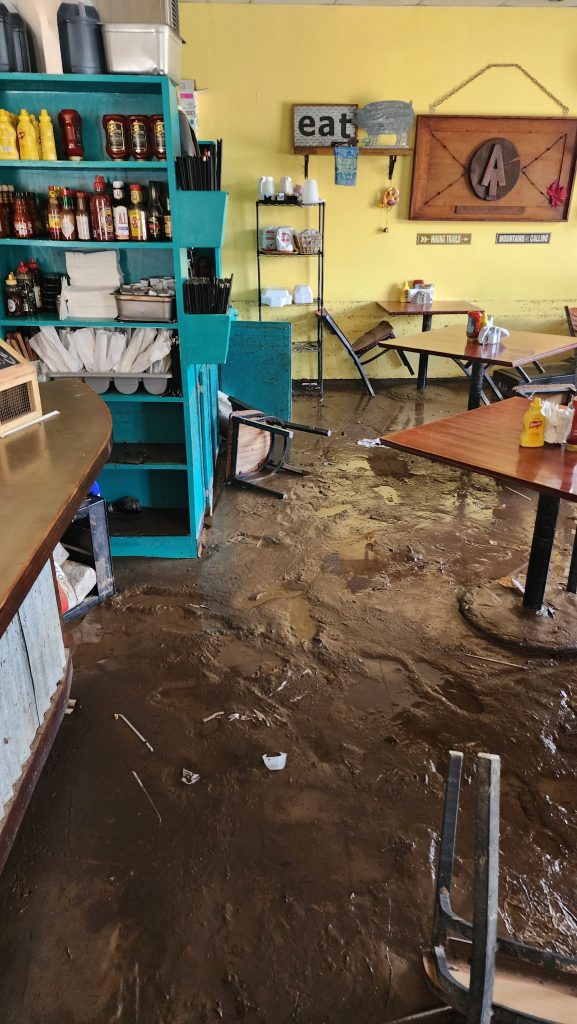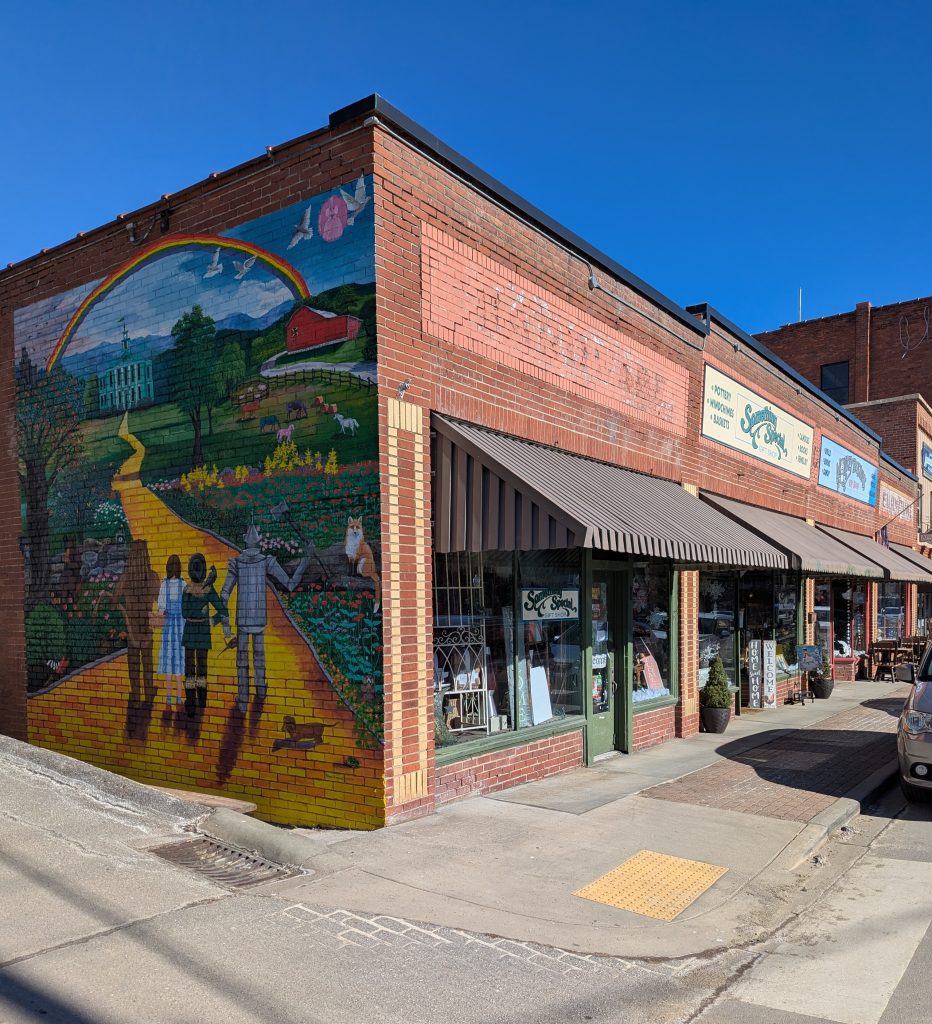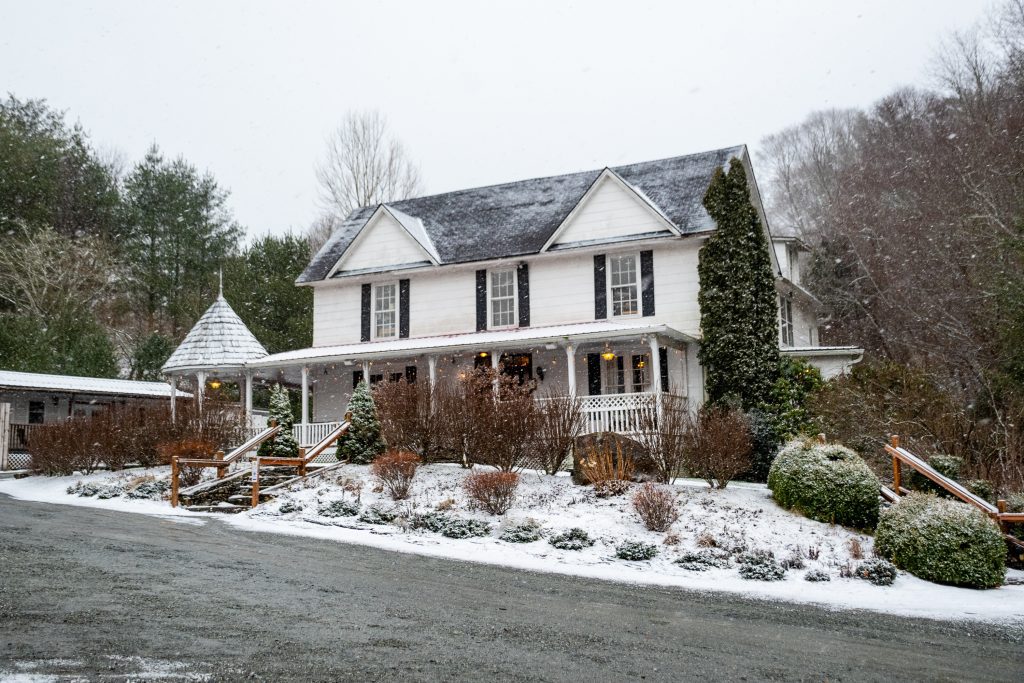Helene’s lingering toll on Appalachian businesses

Small business face delayed federal aid, insurance hurdles and economic uncertainty
“You just can’t imagine the force of water,” says Fred Parker, treasurer of Washington County, Virginia. In the wake of Hurricane Helene’s devastation, Parker recalled an old saying from his grandmother.
“You can’t fence in goats, and you can’t fence in water,” says Parker. “Buddy, was she ever right.”
In late September 2024, Hurricane Helene ravaged Central and Southern Appalachia. Over three days, historic rainfall and extreme wind gusts caused massive flooding and landslides which decimated roads, homes, businesses and parts of communities.
“It’s going to be a while, I think, before we truly understand the economic impact [of Hurricane Helene],” says Kim Effler, president and CEO of the McDowell Chamber of Commerce in North Carolina.
According to a report by the Federal Emergency Management Agency, after a major disaster, approximately 43% of small businesses never reopen, while 29% more cease operations in the following two years.
Once the flood waters receded and the rebuilding process began, many small business owners were left unsure about their next steps. Not only were owners still reeling in shock from the storm itself, but many faced extensive damage to physical property, infrastructure challenges, complicated federal aid options and prolonged loss of income.
Some, like Kevin Saum, owner of the Mount Mitchell Golf Course in Yancey County, North Carolina, found the options for what to do next were entirely “unknown” or discovered through “word of mouth.”
Navigating federal aid
Small businesses do not qualify for direct FEMA aid. Without capital to cover repairs or lost sales, owners may turn to insurance claims, local grants and federal programs like the U.S. Small Business Administration’s Disaster Loan Program, which provides low-interest loans to individuals and small businesses hit by declared disasters.
“The biggest challenge our business community faces is the lack of resources,” says Effler. “There is not enough relief or support for the businesses. The only option that they have is to borrow money in an already challenged economy.”
Only a few weeks after Hurricane Helene, SBA announced its Disaster Loan Program had run out of funding, leaving small business owners with even fewer options than before.
Appalachian Voices, the nonprofit organization that publishes The Appalachian Voice, spent months advocating for disaster relief for the region, emphasizing the importance of replenishing the SBA disaster loan program. On Dec. 21, Congress finally passed a bipartisan funding bill that included $100 billion in aid for disasters around the country, with a significant portion directed toward Helene recovery, avoiding a federal shutdown. The bill included $2.2 billion for the Small Business Administration.
According to an SBA spokesperson, within six hours of receiving funding authority, the agency issued over $1.5 billion in loan offers to more than 21,000 qualified applicants. And an SBA report shows that the agency has offered over $293 million in Business Physical Disaster Loans and Economic Injury Disaster Loans in states affected by Hurricane Helene and disbursed close to $97 million since the storm as of mid-January.
“This quick action ensures that disaster survivors know what loan options are available to them and is a critical step toward receiving the financial relief they need,” says a spokesperson for the SBA. “We remain committed to assisting disaster survivors and are working diligently to process all applications and disburse funds as efficiently as possible.”

One applicant awaiting an SBA loan is Ralph Wilson, owner of several businesses in downtown Damascus, Virginia, including the Dragonfly Inn, Damascus Diner, Wilson’s Cafe and Grill, and Main Street Sweets & Eats.
Known as Trail Town, USA, Damascus is fueled by tourism and outdoor recreation thanks to the Virginia Creeper Trail, the Appalachian Trail and other scenic spots. The small town welcomes more than 300,000 visitors each year. Out of the 34-mile Virginia Creeper Trail, a popular rail-to-trail bicycling destination, the 17-mile section from Damascus to Whitetop was severely damaged and is closed until further notice, according to the U.S. Forest Service.
“Getting the Creeper Trail back open is paramount to recovery,” Parker comments about the economic future of Damascus.
Wilson had to cancel bookings at his bed and breakfast for several weeks, and flood waters “completely wiped out” his diner. He has received local grants from Washington County and Region AHEAD (Appalachian Highlands Economic Aid Directory), but with over $100,000 in repairs on his diner alone, Wilson says these funds are just “a drop in the bucket” compared to what he needs to reopen.
With an SBA loan, Wilson is hopeful but is also concerned about taking on additional debt when he is unsure about what the upcoming tourism season will look like.
“Even though it’s a very generous offer, it is still money that you have to pay back,” he says.
“You have been denied”
According to FEMA, insurance coverage is essential to a business owner’s disaster recovery plan to help recoup lost income or cover damages. However, many business owners report facing pushback from their insurance providers.
In Avery County, North Carolina, Robin Morgan, executive director of the Avery County Chamber of Commerce, says, “It’s hard to think of a business in Avery County that wasn’t impacted” by the storm.
Stonewalls Restaurant has been a staple in the county since 1985. Though the restaurant was relatively unscathed, it was without power for several days and potable water until Oct. 31. Owners Scott Garland and Tim Heschke delayed reopening until Nov. 1, choosing to partner with local and international agencies to serve over 20,000 free meals to people in need in the interim.
“We thought we had done the right thing,” says Garland. “We had taken insurance to cover our employees’ lost wages and business revenue, but our insurance would not cover us.”

Without insurance reimbursement for the business, Garland and Heschke dipped into their savings and didn’t take their own pay through the end of the year. This move ensured the pair could continue to provide their employees with insurance coverage and welcome them back when they reopened.
“We were hoping to retire in about five years, but it’s going to be a little longer,” he jokes.
Kendale Ball and his wife relocated their restaurant, Simpl Cafe, to Newport, Tennessee, along the Pigeon River in June 2024. The couple were expecting their second child and moved from Knoxville to their hometown to enjoy a slower lifestyle.
Ball now refers to this decision as a “blessing and a curse,” as the restaurant was still gaining its footing when Hurricane Helene hit. The cafe sustained flood damage, but while he was still salvaging equipment and assessing the extent of the situation, a woman crashed her car into the front of the building and his storage unit, destroying what he had worked hard to save.
“That pretty much put us at a 100% loss,” Ball says.
Because his business was brand new, Ball did not qualify for an SBA loan. Both his and the driver’s insurance carriers denied his claims, with his carrier dropping his coverage entirely. Facing these roadblocks, Ball wasn’t sure if he would be able to reopen.
“We didn’t have a big nest egg,” he says.
Many communities, like Cocke County, Tennessee have created funds to keep people and businesses afloat in the storm’s immediate aftermath. County Mayor Rob Mathis says the Cocke County Partnership’s Mountain Strong relief fund has distributed over $250,000 to local businesses, and has plans to reassess needs in the coming months.
Simpl Cafe was one recipient of the Cocke County Partnership fund. With this grant and other community support, Ball hopes to reopen in the next few months.
“Locals take care of locals,” Ball says.
Loss of a key income season
Aside from federal aid, insurance woes and steep rebuilding costs, many small business owners face challenging roads after losing income from what is normally peak season in the region.
Before Hurricane Helene, Michael Wright was one of the largest employers in Damascus, employing around 50 people across several small businesses, including Adventure Damascus & Sundog Outfitter, Damascus Outfitters, and Trailhead Designs.
The storm did not physically impact his businesses, but with the loss of a large portion of the Virginia Creeper Trail, Wright is now in a “holding pattern.” He lost his busiest season, which typically sustains his operations through winter.
“Damascus will survive, and my businesses will survive, but it’s going to be a whole lot smaller,” Wright says. “It may be 10 years before I have 50 employees again. It’ll just be a lot more work for a lot less money.”
In Yancey County, North Carolina, which includes the charming town of Burnsville, a key pillar of the economy is being an outdoor tourism destination with a thriving artist scene. Bordering Buncombe County, which is home to Asheville, Yancey County relies heavily on visitors to the scenic Blue Ridge Parkway and nearby Mount Mitchell, the highest peak east of the Mississippi River. Due to significant storm damage, Mount Mitchell State Park is expected to be closed through at least 2026, while a timeline for certain sections of parkway repairs is still unknown.
Elaine Mann, executive director of the Yancey County Chamber of Commerce, explained that sales during “leaf-peeping season,” from September to November, as well as the December holiday season, represent around 40% of yearly income for small businesses.
“We have to support the entire economy,” Mann says. “We’re going to be doing a lot more event-oriented things in downtown Burnsville just to draw folks in regionally and give people things to come to that will help support our artists, businesses and restaurants.”
Dennis and Tina Matelski have owned and operated Something Special Gift Shop in Burnsville since 1985. They opened their second business, Monkey Business Toy Store, in 2005. Over their nearly 40 years in business, they have seen countless highs and lows, but never anything as devastating as Hurricane Helene.

When the Matelskis ventured out in the days after the storm, they found the damage to the community to be “worse than we have ever experienced.” While their business was unharmed and they regained electricity and communications the week following Hurricane Helene, the pair delayed opening until the middle of October.
“We realized we could not open our store,” Dennis Matelski says. “That would be very insensitive to the people who were just trying to have their basic needs met.”
The Matelski’s stores took a financial hit in the weeks following the disaster, but their sales rebounded in November and December. They remained open thanks to community support and their vendors’ flexibility with payment timelines.
“We’re not back to where we were,” he says, acknowledging that many other businesses were not as fortunate. “Hopefully we can continue to move forward and things will get back to some semblance of normalcy for us.”
Uncertain future ahead
For Andy Long, chef and owner of Over Yonder in Watauga County, North Carolina, the weeks-long shutdown following the storm was the “final nail in the coffin” for his restaurant of over 10 years. The eatery dedicated to telling “the story of historic Appalachian cuisine” closed its doors for good on Jan. 19.

Between the rising cost of goods and labor and a disruptive bridge reconstruction near the restaurant, Long’s margins were already tight leading up to Hurricane Helene. His restaurant was not damaged, but he could not reopen until the end of October, a month that typically keeps his business afloat during leaner winter months.
“I know what it takes to get through the winter and then, you know, ramp up for the early summer and get back into it, and we just don’t have it,” Long says.
He was also hesitant to take on additional debt when he was still paying off loans from the COVID-19 pandemic.
“The prospect of taking on a loan to keep a business open that already had razor-thin margins — and might have them again for another year — it’s just a really hard decision to make,” Long shares.
Visitors have been returning to his area and other regions impacted by Hurricane Helene, but Long cautioned that it’s not “business as usual” for him and many others.
“Now’s the time to go support those businesses that you love because once it’s too late, it’s too late,” advises Long. “Go out there and show them love now because they might have to close too. And once they’re closed, there’s not much you can do about it.”
Related Articles
Latest News

Leave a comment
Your email address will not be published. Required fields are marked *





Leave a Comment